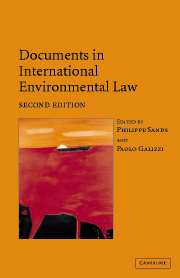Book contents
- Frontmatter
- Contents
- Preface
- PART I General instruments
- PART II Atmosphere
- PART III Oceans: global
- PART IIIB Oceans: regional
- PART IV Freshwater resources
- PART V Biodiversity
- PART VIA Hazardous substances and activities: nuclear
- PART VIB Hazardous substances and activities: pesticides
- PART VIC Hazardous substances and activities: waste
- PART VII Human rights and the environment
- PART VIII War and the environment
- PART IX Trade and the environment
- PART X Environmental impact assessment and access to information
- PART XI Liability for environmental damage and breaches of environmental obligations
- 42 International Convention on Civil Liability for Oil Pollution Damage, 27 November 1992
- 43 International Convention on the Establishment of an International Fund for Compensation for Oil Pollution Damage, 27 November 1992
- 44 Articles on the Responsibility of States for Internationally Wrongful Acts, adopted by the International Law Commission at its fifty-third session, 2001
- 45 Convention on Civil Liability for Damage Resulting from Activities Dangerous to the Environment, 21 June 1993
- 46 International Convention on Liability and Compensation for Damage in Connection with the Carriage of Hazardous and Noxious Substances by Sea, 3 May 1996
- PART XII The Antarctic
43 - International Convention on the Establishment of an International Fund for Compensation for Oil Pollution Damage, 27 November 1992
Published online by Cambridge University Press: 05 June 2012
- Frontmatter
- Contents
- Preface
- PART I General instruments
- PART II Atmosphere
- PART III Oceans: global
- PART IIIB Oceans: regional
- PART IV Freshwater resources
- PART V Biodiversity
- PART VIA Hazardous substances and activities: nuclear
- PART VIB Hazardous substances and activities: pesticides
- PART VIC Hazardous substances and activities: waste
- PART VII Human rights and the environment
- PART VIII War and the environment
- PART IX Trade and the environment
- PART X Environmental impact assessment and access to information
- PART XI Liability for environmental damage and breaches of environmental obligations
- 42 International Convention on Civil Liability for Oil Pollution Damage, 27 November 1992
- 43 International Convention on the Establishment of an International Fund for Compensation for Oil Pollution Damage, 27 November 1992
- 44 Articles on the Responsibility of States for Internationally Wrongful Acts, adopted by the International Law Commission at its fifty-third session, 2001
- 45 Convention on Civil Liability for Damage Resulting from Activities Dangerous to the Environment, 21 June 1993
- 46 International Convention on Liability and Compensation for Damage in Connection with the Carriage of Hazardous and Noxious Substances by Sea, 3 May 1996
- PART XII The Antarctic
Summary
Editorial note
The 1992 (originally 1971) Fund Convention was adopted under the auspices of an International Legal Conference on Marine Pollution Damage to provide additional compensation for victims of oil pollution and to transfer some of the economic consequences to the owners of the oil cargo, as well as the ship owner subject to the original 1969 Convention on Liability and Compensation for Oil Pollution Damage. The original 1971 Convention was amended by three Protocols, most recently by the 1992 Fund Protocol. With the entry into force of the 1992 Protocol, the 1971 Fund Convention is known as the International Convention on the Establishment of an International Fund For Oil Pollution Damage, 1992 (1992 FundConvention). The 1971 FundConvention has ceased to be in force on 24 November 2002, when the number of 1971 Fund Member States fell below 25.
The 1992 FundConvention adopts the same definitions as the 1992Convention on Liability and Compensation for Oil Pollution Damage (1992 CLC) (Article 1). The 1992 Convention, which establishes an International Oil Pollution Compensation Fund (IOPC Fund), has as its objective to provide compensation for pollution damage which is inadequately compensated by the 1992 CLC (Article 2(1)).
To fulfil its objective, the Fund pays compensation to any person suffering pollution damage if that person has been unable to obtain ‘full and adequate’ compensation under the 1992 CLC because no liability arises under that Convention, or the owner cannot meet obligations under that Convention, or the liability exceeds the limit established by the Convention (Article 4(1)).
- Type
- Chapter
- Information
- Documents in International Environmental Law , pp. 1198 - 1223Publisher: Cambridge University PressPrint publication year: 2004



